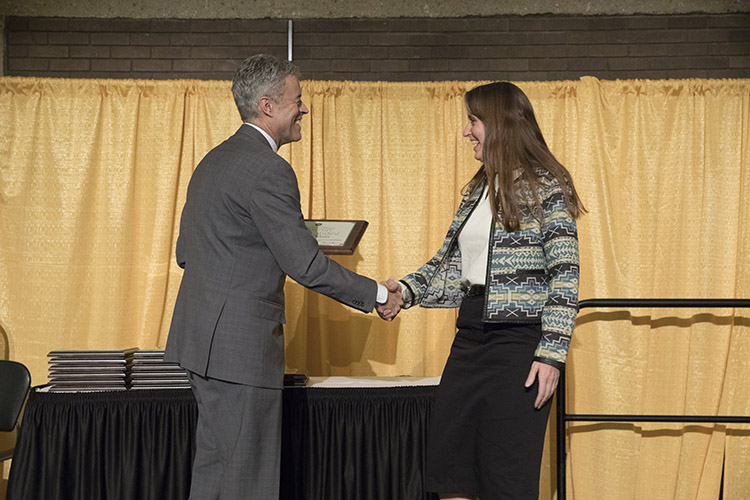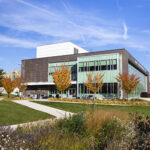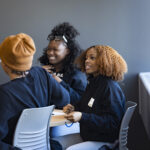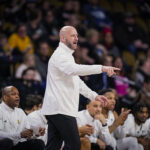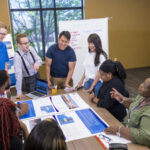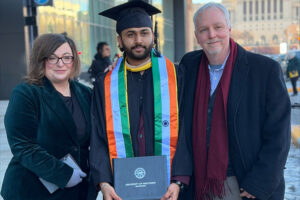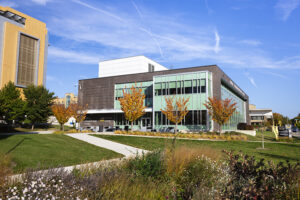Twenty-eight people were honored for their service to UWM during the 2018 Fall Awards Ceremony Oct. 17.
Some were recognized for their outstanding teaching and efforts to help students, others for their service to scholarship and toward making the university a better place to work and study.
Distinguished Undergraduate Teaching Award:
David S. Allen, professor, Journalism, Advertising and Media Studies
A professor whose expertise is rooted in experiences as a reporter, David S. Allen has created innovative courses and new ways to teach foundational courses in media writing, ethics and law. Allen was the first in JAMS to offer courses through UWM Online and integrate podcasts into his teaching.
Allen’s knowledge of the material, openness to debate and passionate belief in a bright future for journalism inspires and challenges. “That class was what I wanted out of a college experience from the moment I applied,” writes one student.
His students study a range of media texts, from news releases to product pitches, and engage in policy conversations that draw upon Allen’s teachings on constitutional law. “(His) assignments turn theory into practice and give students an experience that shows how course concepts matter in the media workplace and broader society,” writes a colleague.
As faculty advisor to the UWM Post, Allen helped staff journalists secure a $5,000 grant for a video commenting platform so that more voices can contribute to discussions.
Winson Chu, associate professor, Department of History
Even award-winning professors like UWM’s Winson Chu can benefit from free advice, like this gem that turned up in one of Chu’srecent course evaluations: “Teach more classes!”
Though his material can be somber, including lectures on the two world wars and smaller courses on Germany during and after World War II, Chu employs a variety of tools to keep students engaged. He plays snippets of songs popularized by soldiers of the time and integrates maps and photos into his lectures to keep students invested and interested in the content beyond note-taking and memorization. Questions that Chu doesn’t get to during class are addressed during his well-attended office hours.
“Professor Chu has a reputation in our department for encouraging undergraduates to feel responsible for their own progress,” writes a colleague and nominator. “I am pleased that when students who have taken his courses subsequently enroll in mine, they have a firm grasp of the basic questions and methods that are crucial for understanding historical change.”
David J. Pate Jr., associate professor, Department of Social Work
What makes David J. Pate Jr. an exemplary educator is an unflinching ability to examine society’s most vexing issues in a way that engages students and prepares them for careers addressing poverty, racial segregation, education inequity, crime and homelessness. “His courses integrate the most recent research into an examination of these issues and how social work can address them individual and collectively,” writes a colleague.
Pate’s research brings the community to UWM and has shaped him as an expert on the life course of African-American men. Students are encouraged to benefit from this community orientation by attending colloquia Pate organizes, meeting his research participants on campus, or curating a gallery exhibition in response to the Black Lives Matter movement.
Students compliment Pate as a challenging professor who gives his best and makes similar demands of them. “Very analytical and incredibly challenging” is how one student describes Pate’s course. “Dr. Pate is always knowledgeable and pushes us out of our comfort zone,” writes another. “He makes us think critically about issues of race.”
UWM Faculty Distinguished University Service Award
Vytaras Brazauskas, professor, Department of Mathematical Sciences
Since arriving at UWM in 1999, Vytaras Brazauskas has tirelessly worked through the rigorous criteria necessary to make the university’s actuarial sciences program exceptional. His work, writes a colleague, “has truly put the mathematical sciences department, and UWM, on the map.”
His efforts were rewarded in 2016, when UWM’s actuarial sciences program received the Center of Actuarial Excellence designation from the Society of Actuaries. Only 224 of the world’s nearly 1,000 actuarial science programs are accredited by the society and only 31 hold the society’s Center of Excellence status.
To accomplish this, Brazauskas initiated an actuarial science BA program in 2006, including creation of eight all-new courses at UWM, ranging from foundations of professional practice to actuarial risk theory. He chaired three successful search and screen committees to expand the program’s teaching and administrative ranks. He networked with businesses seeking new actuarial talent, culminating in a $750,000 gift to the program from Northwestern Mutual, whose leaders recognized Brazauskas’ ability to take the UWM program from “promising to full potential.”
Margaret Noodin, associate professor, Department of English
As director of the Electa Quinney Institute for Indian Education, Margaret Noodin carves out spaces for indigenous cultures on campus: supporting a student housing policy that includes the spiritual use of candles, incense, sage and more; securing $2 million in grant funding to mentor indigenous teachers and students; and recruiting, advising and mentoring American Indian graduate students.
A colleague describes her trailblazing efforts as a teacher of Anishinaabemowin (the Anishinaabe or Ojibwe language): “She’s developed a sequence of six courses, including audio and video instructional files, from introductory to advanced levels.” Co-chair of the Academic Program and Curriculum Committee, she chaired multiple program reviews.
“(Noodin) and her classes translated several songs from Gaelic into Anishinaabemowin,” a colleague writes. “They spoke about how to translate the words ‘sea’ and ‘canoe,’ and how to transplant Irish consonants into long Native-American vowels. All of us were simply transfixed. Truly, the joint chorus in Gaelic and Anishinaabemowin sent shivers down my spine. I believe this may be the one and only time that anyone worked systematically to convert Gaelic into Wisconsin’s native tongue.”
UWM Faculty Distinguished Public Service Award
Kimberly Blaeser, professor, Department of English
A woman of letters, Kimberly Blaeser’s impact on Native American identity, American poetry and UW-Milwaukee is perhaps best summarized in numbers:
- 200 poems written while at UWM
- 90 appearances made as Wisconsin poet laureate, 2015-16
- 43 articles, essays and introductions written
- Eight years since she founded the Milwaukee Native American Literary Cooperative
- Seven letters supporting Blaeser’s nomination for this award
- Six languages her work has been translated into
- Five nominations for a Pushcart Prize
- Three volumes of poetry and one book to her name
Through this partial list of accomplishments, Blaeser has made Wisconsin her classroom. Her poetry and scholarship, colleagues say, are moving Native American authors beyond the genres of ethnography and minority literature. “Trail-blazing,” “true,” “visionary,” “tremendous” and “heartfelt” are some of the ways colleagues, friends and students describe Blaeser’s myriad contributions.
Office of Research/UWM Foundation Research Award
Julie Bowles, assistant professor, Department of Geosciences
To conduct her research, Julie Bowles has participated shipboard on multiple ocean drilling projects that aim to look deeper into the Earth’s crust. Bowles is interested in variations in the strength of Earth’s magnetic field throughout its history, a field called paleo-intensity, and also the “rock records” of field variations, called paleomagnetism.
Drilling provides insight into short- and long-term magnetic field behavior, which is used to determine the evolution of Earth’s core. Whether on land or water, she is making new discoveries that have profound implications for paleo-intensity.
Bowles’ record of research and her ability to obtain funding are very impressive for a person at her level, say her nominators. In the last 10 years, Bowles has amassed $2.8 million in research funds from the National Science Foundation, Oceanographic Institutions/U.S. Science Support Program and NASA.
“Her future is certainly bright, as she has considerable ongoing research, partners with some of the best and brightest in our field and works on difficult but rewarding topics,” says Laurie Brown, emerita professor of geophysics at the University of Massachusetts, Amherst.
Winson Chu, associate professor, Department of History
Winson Chu’s research lies at the intersection of German and Polish history and cultures during the 19thand 20thcenturies,with an emphasis on multicultural populations, ethnic cleansing and diasporas.
His 2012 book, “The German Minority in Interwar Poland,” examines three historically distinct German communities living in Poland who were brought together only by the revolutionary changes of 1918-1919 that ended multinational empires and re-drew the borders of European nations. It discusses intra-ethnic rivalry, national identity and citizenship under the pressure of international conflicts.
The relevance of his work in today’s world of mobile and refugee populations, ethnic nationalism and minority conflicts has already made him a much-invited speaker.
One nominator,Margaret Lavinia Anderson, emerita professor at UC-Berkeley, describes Chu as a scholar of enviable range with an eye for paradoxes and a rising profile among international scholars. “Winson is on the verge of becoming one of the leading historians of his generation,” she says.
Deborah Hannula, associate professor, Department of Psychology
Cognitive neuroscientist Deborah Hannula is an exceptional, independent scholar whose innovative research program has made important strides in understanding the nature of memory. Hannula’s main interest involves episodic memory, or individuals’ ability to retain information about an event and the spatio-temporal context in which the event occurred. Episodic memory is traditionally considered to be conscious recollection, but Hannula has demonstrated that obligatory eye movements can reveal unconscious memories activated in the brain’s hippocampus.
The work has been supported by a prestigious Early Career Award from the National Science Foundation, the first awarded to a UWM psychology faculty member. Hannula’s research papers have been widely cited by other scientists. Simone Ghetti, a professor of psychology at UC-Davis, notes, “Her research is always carefully designed and beautifully described, and some of her manuscripts are on the road to become classics in cognitive neuroscience.”
Hannula has devoted much time to community outreach events like the UWM Science Bagshows and Upward Bound Math & Science. She also has been featured in media outlets such as Scientific American, Science Dailyand Science Now.
David Kaplan, associate professor, Department of Physics
David Kaplan is a leader in several distinct areas of astrophysics and has been continuously funded by the National Science Foundation since 2010. “Kaplan is a gem that any top-tier university would like to have as a member of its faculty,” says nominator Jim Cordes of Cornell University.“I would put him in the same league (but different era) as Shri Kularni, his PhD advisor at Caltech.”
Bryan Gaensler of the University of Toronto says, “Kaplan has distinguished himself by becoming a key global leader in the burgeoning fields of time-domain astronomy and multi-messenger astrophysics. He is both the glue that has assembled new teams to pursue new science, and also the individual driving force that has made many recent discoveries.”
An example of this is the findings from a paper published in Science in 2017 that reported on multi-wavelength, electromagnetic observations of the explosion that followed the merger of two neutron stars. The work suggests that most of the gold and platinum in the universe originated in neutron-star mergers.
John Reuter, associate professor, Department of Political Science
John Reuter is anexample of an early-career scholar making his mark on his field. He uses a range of techniques to ask important questions about the institutions of authoritarian government.
Much of the existing knowledge on these governments comes from descriptive single-nation or single-leader case studies. Reuter uses surveys, causal process tracing methods and cross-national empirical tests to explore hypotheses about how authoritarian regimes work to retain their power. His book, “The Origins of Dominant Parties,” is a major contribution to the literature on both authoritarian regimes and Russian politics. It asks and answers the question of why dominant parties emerge in some times and places but not in others.
“Reuter is one of the most promising young scholars conducting research on the institutions of authoritarian government and among the very top scholars in his cohort working on Russian politics,” says Daniel Treisman of UCLA. Joseph Wright at Penn State University adds, “By one metric, Google Scholar, Reuter’s publications citation count puts him among the most highly cited scholars in this field at this stage of his career.”
Office of Research/UWM Foundation Senior Faculty Research Award
Sandra McLellan, professor, School of Freshwater Sciences
Sandra McLellan’s lab explores the links between environmental processes and human health. She has applied next-generation molecular and genomic tools to characterize microbiomes, which are essentially the ecosystems created by microorganisms, in humans and animals as well as water in beaches and sewer systems.
The new information gleaned by this research has enabled her to identify human and animal sources of waterborne pollutants and pathogens. She captured international attention when she and her colleagues found they could monitor the health of the population of a hospital or city by analyzing the microorganisms in raw sewage.
McLellan may be best known locally for identifying sources of E. coli—the main culprit in beach closings. As her School of Freshwater Sciences colleague Ryan Newton observes, “Her work was a primary reason Bradford Beach transformed into a city asset and destination.” She is now focusing on the troubled South Shore Beach.
She is also recognized as a student mentor and advocate for educating the public about science and its role in public policy. Her lab members include postdoctoral scholars, graduate and undergraduate students and research specialists.
Rebecca Dunham, professor, Department of English
As described by her UWM colleague George Clark, the poems of Rebecca Dunham “bear witness to social injustice, ecological disaster and the human experience.”
In her widely acclaimed book “Cold Pastoral,” Dunham traces the 2010 Deepwater Horizon oil rig explosion, Hurricane Katrina and the Flint water crisis. Initially funded by a $40,000 UWM RGI award in 2011, “Cold Pastoral” has been declared one of “40 New Feminist Classics You Should Read” by prominent literary website The Literary Hub. The Colorado Review calls it “a coalescence among artistic purpose, beauty on earth, and the realization of one’s own mortality.”
Her numerous distinctions and honors include the prestigious T.S. Eliot Prize for her 2006 dissertation — a book titled “The Miniature Room” — and a National Endowment for the Arts Literature Fellowship in Poetry in 2007, the year she began at UWM. Her forthcoming book, “Strike,” has earned the Editor’s Choice Award from its publisher, New Issues Press.
UWM Outstanding Creative Research Achievement Award
Chris Cornelius, associate professor, Department of Architecture
Chris Cornelius, an enrolled member of the Oneida Nation of Wisconsin, focuses his research and practice on the architectural translation of Native American culture.
Cornelius is widely acclaimed for his drawings, as evidenced by awards from the prestigious KRob Architectural Delineation Competition, the American Society of Architectural Illustrators, and the American Institute of Architects, whose 2009 Design Excellence Award recognized his work as collaborating designer of Indian Community School of Milwaukee. Cornelius also earned the J. Irwin and Xenia S. Miller Prize, which recognizes international leaders in their fields who bring unique perspectives in connecting people to place and community. His drawing “Wiikiaami” — designed as a gathering place and to mark the autumnal equinox — was built in 2017 outside the First Christian Church in Columbus, Indiana.
Cornelius has also designed several buildings at the Oneida Nation near Green Bay.
As Karl Wallick, associate professor and chair of the Department of Architecture, points out, “This drawing research has crossed over into the realm of physical construction where his ideas are being tested in new scales and dimensions.”
Kimberly Cosier, professor, Department of Art & Design
Kim Cosier’s research addresses the interconnected issues of anti-racist and anti-biased teacher education, urban education, alternative education for at-risk youth and underserved populations, and art and education for social justice.
Programs she has established include ArtsECO, which partners with nonprofit arts organizations and schools to develop teachers as change-makers; the Milwaukee Visionaries Project, an award-winning media literacy, video, and animation production project for middle and high school students in Milwaukee; and the Kenilworth Gallery Community Engagement Initiative, an arts-based community engagement laboratory in the Kenilworth Square East gallery. Professor and chair of the Department of Art & Design Kyoung Ae Cho observes, “These programs have been … building the reputation of the Peck School as one that is committed to arts and social justice through service and art-making within the community.”
Cosier’s work is supported by grants from such organizations as the Wisconsin Arts Board, Margaret A. Cargill Philanthropies, Greater Milwaukee Foundation Nohl Fund, and Milwaukee Public Schools Arts and Humanities Partnership. She also co-edited the 2016 book “Rethinking Sexism, Gender, and Sexuality.”
UWM Academic Staff Outstanding Performance & Service Award:
Monica Rausch Camacho, senior advisor, Sheldon B. Lubar School of Business
Applications to the Lubar Business Scholars program are rising, international students have a knowledgeable go-to point person and sophomore students are better informed of their requirements to declare a major in one of the state’s top business schools.
On all these fronts and more, Monica Camacho has been a results-driven leader and trusted team member, making her the university’s 2018 outstanding service awardee. In addition to supporting her 1,300-plus advisees, she has paid particular attention to the needs of international and high-achieving students. She has served as volunteer teacher of a noncredit course for international students adjusting to college life in the U.S. All programming, from admission to graduation, of the school’s Lubar Scholars falls under her direction. With her close-knit team of fellow Lubar advisors, Camacho helped identify new ways to support the school’s sophomore students. The proposal that she helped write was implemented by Lubar administration, with 88 percent attendance by invited students.
“Her university service (including six committee memberships) exceeds my high expectations,” writes one nominator. “Monica serves as a dynamic supporter of the Lubar and UWM communities.”
Rebecca Freer, interim dean of students
In her role in the Dean of Students Office, Freer has worked hard to support and encourage students. “As interim dean of students, Becky has overseen sweeping changes in the way that office operates, moving that office into new territory to deal with a changing student demographic,” writes Rob Longwell-Grice, recruitment and scholarships coordinator in the School of Education.
Among her recent accomplishments were organizing a team to apply for a grant from the Great Lakes Student Loan Association that has provided $630,000 in funding for emergency aid to students. That fund helped 244 students in the fall semester of 2017 who faced sudden financial crises that jeopardized their ability to complete their degrees.
In addition to serving on numerous campus committees, she has also helped establish a response to support students and families affected by a death, and worked with other campus leadership to address disruptive student conduct. Having completed her own doctorate in Urban Education-Adult and Continuing Higher Education, she now teaches online courses in that area, and mentors graduate assistants and interns.
Bairbre Ní Chiardha, lecturer, Department of Celtic Studies
Colleagues of Ní Chiardha cite her outstanding organizational abilities, promotion of Irish language and culture, service to the community and dedicated teaching in nominating her for this award.
“Bairbre stretches the Center’s relatively limited resources with inventiveness, networking and collaboration with other entities within and outside of the university, and extraordinarily hard work. She is one of the main reasons why the UWM Center for Celtic Studies is able to punch well above its weight and has an outstanding reputation far beyond Wisconsin’s borders,” the center’s co-director, Professor of English José Lanters, wrote in nominating her.
In addition to teaching Irish language classes at UWM, she has been instrumental in writing a grant for Irish government funding to support the program. She encourages students to study abroad in Ireland and welcomes visiting educators and artists from Ireland.
She also organizes Irish language immersion weekends and a well-received national Irish language teaching workshop. She serves as a liaison to Milwaukee’s Irish Fest, teaches Irish language courses and promotes UWM and its Celtic Studies program at that event.
UWM Academic Staff Outstanding Teaching Award:
Vicki Bott, senior lecturer, Department of English
Bott’s student evaluations routinely characterize as “the best teacher ever,” S. Scott Graham, associate professor of English, writes. Graham says that when he asked a colleague for any notes on Bott, the reply was: “I’m sorry I don’t have more detail than this. There wasn’t much point in documenting one ‘best teacher ever’ after another.”
Bott has encouraged her students in English 430 and 102 to write for publication and submit their work to a trade or professional publication or website. Her students in English 430 wrote a brief handbook called “A Student’s Guide to Revising,” which four of them presented at the Midwest Modern Language Association conference in 2017. Three of those students continued developing it, under her supervision, with funding from UWM’s Support for Undergraduate Research Fellows program, and it may be included in a future textbook.
Beyond the university, Bott works with the M-cubed project, a collaboration of UWM, MATC and MPS. As part of pilot grant, she worked with MPS seniors, going above and beyond to provide on-site tutoring at MPS schools.
Kelly Kohlmetz, senior lecturer, Department of Mathematical Sciences
Kelly Kohlmetz, who has taught mathematics at UWM for more than 20 years, has been instrumental in helping the mathematics department in its developmental mathematics reform.
“She cares passionately about her students, working with them both in and out of class to help them succeed,” says Kevin McLeod in his letter of recommendation. “She has been using active-learning, student-centered pedagogy as long as I have known her, and when you observe one of her classes you understand why this approach, done right, produces results.”
As the coordinator of Math 092/102, Kohlmetz has helped increase the percentage of students passing these key pathway courses to more than 75 percent, much higher than the rate for the previous traditional algebra courses.
She regularly attends workshops to improve her teaching, and helps coordinate mathematics book clubs. “She is consistently reading to find more ways to help students that have had trouble with mathematics their entire life,” writes Leah Rineck, senior lecturer in mathematics.
UWM University Staff Outstanding Service Award
Tony Ally, student services examiner, Office of Undergraduate Admissions
“As a senior member of the Application Review and Residency Specialist Team, he’s a quiet leader who has a huge impact on his colleagues, and provides extraordinary customer service for the students and families that we serve,” writes Kristin Boehm, his supervisor.
While Boehm was on maternity leave, Ally took the lead in working with colleagues in evaluating admission requirements, including the complex residency issues that affect tuition. “He navigated some very difficult and trying cases with students and families, and did so with an understanding, solution-focused attitude and a calm nature and admirable ability to explain complex regulations in a way students could understand and navigate,” says Boehm.
Ally also took on a new role as admissions officer and helped the office deal with an influx of admissions, a data systems outage and staff transitions. “His willingness to take on extra tasks and his optimistic attitude made for a lasting positive impression on students and families,” Boehm writes.
Bron Nehring, legal support staff confidential, Office of Legal Affairs
Bron Nehring did everything in her power to keep the Office of Legal Affairs running smoothly after one of the attorneys retired. As the office manager and intake coordinator, she worked to pick up slack and assist others in updating contracts and routing legal documents, so the office’s attorneys have more time for casework.
She is the first point of contact for many visitors, and sometimes has to quickly arrange meetings between administration and attorneys to address urgent legal matters in a timely fashion.
As one nominator writes, “She is friendly, enthusiastic and helpful. Whether she is addressing a dean or a student, she always communicates in a respectful, empathetic manner and exhibits a remarkable degree of professionalism.”
On a faculty investigative committee, she proved invaluable in organizing meetings and proofreading reports. The committee chairperson writes, “Bron did outstanding work and assumed duties with professional grace and excellence that reflected well on the Office of Legal Affairs and the university.”
Monica Rodriguez, IS business automation specialist, Business & Financial Services/Accounting Services
Monica Rodriguez led the Process Improvement and Training team that streamlined accounting procedures at UWM and helped create the Integrated Support Services hub. The project created long-term efficiencies, increased effectiveness, implemented cutting-edge technology and enhanced professional development in UWM’s finance and accounting, procurement, human resources and information technology services.
As a business automation specialist for UWM Accounting Services, she was not initially familiar with all aspects of the processes she was tasked with streamlining. However, she put in extra time outside working hours to learn as much as she could.
She also volunteered to participate in E-Workflow training to help implement the processes designed by her team, and has since trained her coworkers to use the new system.
As one of her fellow team members writes, “Our team owes much of its productivity to Monica’s dedication, organization, motivation, determination and sheer talent. Her contributions to the team have a far-reaching, positive impact on campus.”
Angela Schmocker, financial specialist senior, Business & Financial Services/Pre-Audit
Angela Schmockerwas involved in creating the Integrated Support Services hub from the very beginning. She put in extra hours outside her job as a financial specialist senior for UWM’s Business & Financial Services to make sure that the ISS hub was successfully implemented. She served on the project’s design committee for procurement to improve purchasing processes and save money.
She has also worked to implement E-Workflow processes for direct payment forms and miscellaneous refund forms. These forms allow all campus divisions in the ISS hub to quickly process purchasing orders and payments. She has taken extra time to train her colleagues in the new system.
The nominator writes, “Angie’s outstanding contribution will benefit the entire UWM campus on a daily basis by improving efficiencies and cost savings for the university. Without her input, these projects would not have been completed in a timely manner.”
UWM Advisor of the Year Award
Brian Williams, senior advisor, School of Information Studies
Brian Williams is dedicated to fostering student success in the School of Information Studies and across campus. As a senior advisor in the school, he has gone above and beyond to support and advocate for students.
One student writes, “Brian is deeply committed to building relationships with students. He always greets students with a smile and makes a point to learn every student’s name. He treats everyone with dignity and respect.”
He took the initiative to create an advising internship for UWM students, and as an active member of his school’s undergraduate program committee, he has worked to review and revise the information studies undergraduate curriculum.
Another student writes, “Brian is always quick to respond to my needs. He answers all my questions completely and explains the options available to me by looking at the positive and negative outcomes to help me make good decisions.”
Outside his school, he has been a campus leader by co-chairing UWM’s Advisors & Counselors Network, volunteering on the Chancellor’s Advisory Committee on Mental Health and mentoring students through the UWM Association of Student Affairs Professionals.
LGBTQ+ Champion of the Year Award
Gary Hollander, lecturer, Department of Psychology
“Dr. Hollander has spent 50 years teaching that each person has value and rights, irrelevant of gender orientation,” writes Stephen Berman, one of those who nominated Hollander for this award. “Leading by example, he has allowed his students to understand, support and defend the rights of the LGBTQ community. The lesson taught are an integral part of the tools that future psychologists and social workers will need to successfully serve this community.”
“Gary’s teaching style is fabulous,” writes Linda Berman, who audited one of his classes. “I wish he wasn’t retiring because he has so much to offer but know he will continue to be actively involved with the LGBTQ community forever more.”
Hollander’s research and publications have helped shape public policy around LGBTQ+ issues. Even in retirement, he plans to continue serving on committees to improve lives in the LGBTQ community such as 414ALL and Diverse and Resilient. “He works on many committees in Milwaukee to improve the lives of not only the LBGTQ community, but minority communities such as the African-American and Latin American population,” Berman says.
Joanne Lazirko Award for Excellence in Teaching with Technology
Philip Chang, associate professor, Department of Physics
For students in the science and engineering fields, introductory physics with calculus is a rite of passage, and for many it is a tortuous journey. Philip Chang, associate professor of physics, has used technology to help them.
Chang, who has received an NSF Early Career Award, was already combining online homework and materials in his teaching. However, because solving physics problems from start to finish often involves a lengthy process, Chang felt students needed more help.
His solution was to record video tutorials as examples that are similar to, but not the same as, their homework. Since Chang started using the tutorials, which he uploads to YouTube, he has compiled an online library of more than 100 examples that receive thousands of views. The number of students continuing from the Physics 209 to 210 courses has increased, and surveys showed students found the videos very helpful.
“Professor Chang has correctly observed that students who begin to struggle early in the course often never recover, and he has imaginatively addressed this issue,” writes Robert Wood, associate chair of the Physics Department, in recommending Chang for this award.
Ernest Spaights Plaza honorees
Karen Brucks (1958-2017), assistant professor, associate professor emerita and department chair, Mathematical Sciences; and associate dean of Natural Sciences, College of Letters & Science
Service to UW-Milwaukee: 1990-2015
Karen Brucks served UWM for 24 years as a dedicated instructor, researcher, mentor and advocate. She had a distinguished service record, serving as the first female chair of the Department of Mathematical Sciences for four years, as associate dean of natural sciences in the College of Letters and Science for seven years, and managing campus space for three years.
She exemplified ethical and collegial qualities throughout her career, and at many junctures, otherworldly patience. This was particularly evident during the five-year planning effort for UWM’s largest academic construction project – the Kenwood Interdisciplinary Research Complex. Brucks’ assiduous efforts to find common ground led to a final product that delivered the facilities that were most critical to UWM’s mission.
Colleagues recall Brucks as a decent, kind, fair-minded individual who handled challenging circumstances with equanimity and grace. Her ability to defuse potentially contentious issues in a quietly powerful and inclusive manner made an impact that paved the way for relationships and progress that would not have happened without her influence.
Devoted to service on behalf of STEM students and women, Brucks is remembered as a champion for those from underrepresented groups. She set an enduring and powerful example with her intensive and personal mentorship of many who now carry forward that same dedication to and support of the next generation.
She was instrumental in procuring and administering two high impact National Science scholarship programs – Computer Science, Engineering and Mathematical Sciences and COMPASS – that provided an enhanced foundation for mentorship and professional development for underrepresented, academically talented and financially needy STEM majors.
The University of Wisconsin-Milwaukee and its Honorary Degree Committee are proud to recognize Karen Brucks for this award – an everlasting tribute for her significant impact and contributions to the university and its people.
Ewa Barczyk, associate provost and director, UWM Libraries
Service to UW-Milwaukee: 1985-2016
Ewa Barczyk’s deep commitment to transforming the UWM Libraries through advances in technology and the changes in how learning occurs are well-known at UW-Milwaukee and globally. She believed that libraries are the convening spaces of the world, and this passion fueled significant advancements during resource-challenged times.
Described as an exceptional leader, partner and colleague, Barczyk was the major force behind fundraising efforts for several successful evolutionary and growth aspects of the UWM Libraries. Of note is her leadership in the planning and creation of the Daniel M. Soref Learning Commons, which transformed the library into the vibrant, intellectual center that it is today. She presided over the rapid digitization of scholarly resources and the creation of the UWM Digital Humanities Lab, and she increasingly distinguished UWM through the Libraries’ rare and unique holdings.
Under her leadership, the UWM Libraries continued to grow in importance – both for its contributions to the instructional mission of the university and to the research mission. Colleagues identify Barczyk’s work as an important contributor for UWM’s growth into a R1 doctoral research university. With additional curation in the UWM Digital Commons, the work of UW-Milwaukee students is now available worldwide and is downloaded by current and budding scholars thousands of times annually.
In addition to her UWM Libraries role, Barczyk was at the helm of the Wisconsin Women in Higher Education Leadership as the state level board officer and as chairperson of the UWM section.
Her impact extended well beyond the UWM Libraries. She fostered global connections, hosting international interns and graduate students, visiting scholars and foreign dignitaries; and traveling as a UWM representative to deliver presentations in numerous countries. She was and remains a markedly positive influencer for libraries. In her retirement, Barczyk serves as president of the Polish American Librarians Association and is editing a travel guide to Polonia historical sites.
Barczyk has been a remarkable contributor to UW-Milwaukee and its communities. UWM and its Honorary Degree Committee are proud to recognize Ewa Barczyk with the Ernest Spaights Plaza award.
